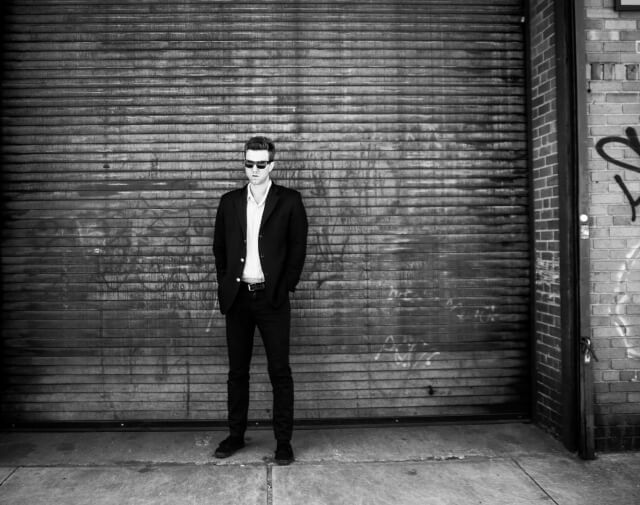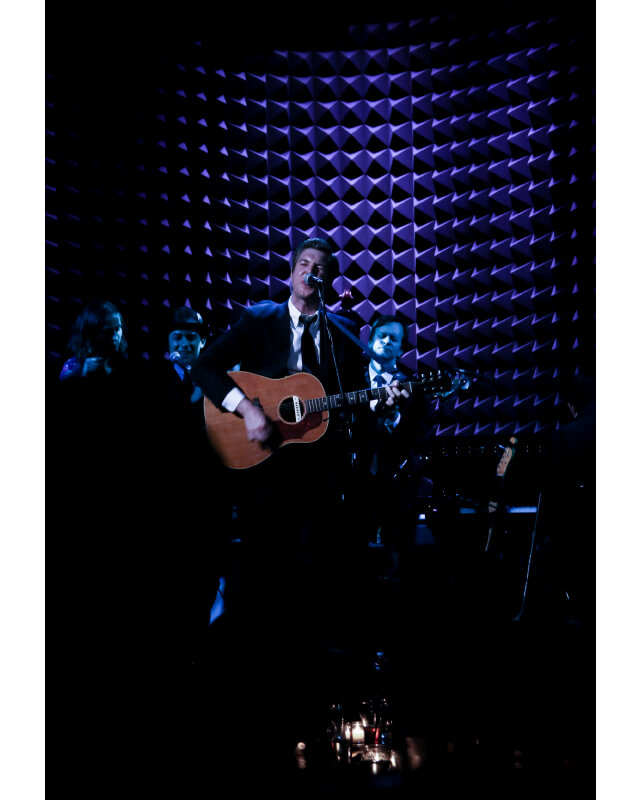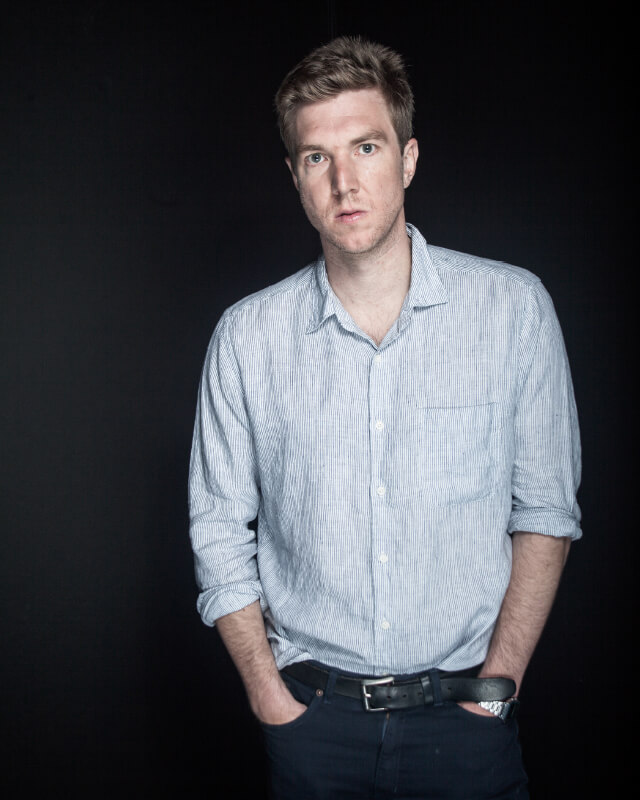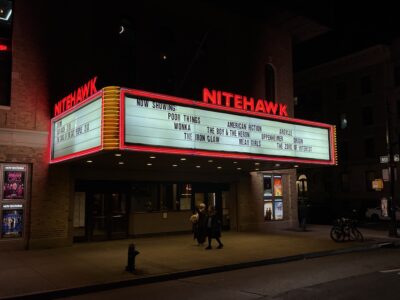Retiring The Walkmen: Hamilton Leithauser Goes Solo


Hamilton Leithauser is onstage at Joe’s Pub, dressed in black jeans, a white button-down, and a navy blue blazer with gold buttons—the kind worn by little boys or middle-aged white men out for a nice dinner. He’s backed by a 12-piece band: horns, strings, people shaking things and singing multiple-part harmonies. The sound is loud but not blaring, so clearly defined that you easily understand exactly why every single person onstage is there. The crowd, seated at tables as waiters and waitresses bring them drinks, is older but still strikingly attractive and put-together, like they’d just come from jobs that offer dental insurance. It’s the second of a two-night run at the decidedly elegant Lower East Side venue, Leithauser’s first shows since his longtime band, The Walkmen, called it quits. It feels like a coming-out party, or like an industry showcase from a forgotten era.
I’m surprised that I find this vibe refreshing rather than irritating. But now that all anyone ever wants to talk about is Brooklyn’s proliferation of DIY venues and the democratization of music and taste and everything else at the hands of the Internet, it’s nice to see this much weight given a performance. It flies in the face of everything DIY is about: rather than celebrating the attendant sense of community, the simple joy of being a part of something, there exists here a firmly established hierarchy. We’re there to watch and to listen, and the harsh truth is that it doesn’t have very much to do with us beyond that.
A few weeks later, I mention this to Leithauser over beers and Bloody Marys at a little café near Fort Greene Park. He seems pleasantly surprised by my assessment and for a moment appears to let on that he thinks he’s earned it, maybe, that this is how things are supposed to be. “Oh yeah, cool,” he says, eyes widening ever so briefly before he pulls back. “I’m glad you think that. I really care about these songs. I feel a strong connection to all of the parts, start to finish, in every song. I’m very connected to everything on the record.”


The record in question is Black Hours, his entry into the historically fraught “first solo album after the breakup of a successful former band” category. That it exists at all comes as a bit of a shock. It’s now so difficult for a band to make a living for any period of time, let alone the 13 years The Walkmen were such a force in the indie rock world; it’s even more difficult to imagine anyone walking away from something that’s still working just fine. “It wasn’t easy,” he says, before a long pause. “We were supporting five families.”
It had been years since they’d operated in the traditional way that a band operates, getting together in one room to write and rehearse, and then heading into a studio to record. They’d been spread all over the country since 2008, which made the writing process cumbersome and time-consuming. Though they remained generally happy with the work they’d done, including their 2012 swan song Heaven, they’d lost some of the urgency. “There came a point where no matter what anyone brought to the table, it was always going to wind up sounding like The Walkmen.”


Black Hours does not sound exactly like The Walkmen, but it does sound more like The Walkmen than you might expect. It’s dominated by Leithauser’s voice—which will come as no surprise to anyone who’s ever heard him sing. The way it quietly aches and then becomes more desperate as it climbs in both volume and register makes it one of the more affecting instruments being used anywhere right now. It’s allowed plenty of room to shine on Black Hours, given the way the album experiments with scaled-back arrangements that focus on orchestral elements. “That was my original idea for it,” says Leithauser. “To make a record focusing on the things I thought were my strengths. It was strings and vocals. I didn’t even want there to be drums.” But before The Walkmen packed it in, he’d been working on a few songs with that band’s guitarist, Paul Maroon. “I thought about making a clean break,” he says, “but I didn’t want to just throw away all the work I’d done with Paul. I know it’s weird that he’s such a big part of it, but we have a really good songwriting partnership that we’ve developed over the years.”


Live at Joe’s Pub, April 16th. Photo by Mike Conklin.
Another partnership that helped the record take shape was the one he formed with Rostam Batmanglij, the producer and multi-instrumentalist most known for his role in Vampire Weekend. He’d heard that Leithauser was looking to make a solo record, and he reached out to say he’d like to work on it. Batmanglij wound up producing two songs: the upbeat first single “Alexandra” and the slow-burning “I Retired,” which serves as the album’s centerpiece. It’s a perfect combination of the stripped-down approach Leithauser had in mind at the outset, and the more rock-oriented direction in which Batmanglij and Maroon were pushing things. It chugs along quietly, with hand-claps and a weeping slide guitar while Hamilton’s voice rises and falls over “shoobee doo wop” background vocals, grappling with the same stuff he’s been grappling with for a while now: “I’ve retired from the fight,” he sings, and it feels not so much like a true statement or even a threat, but like he’s trying it on to see if it suits him, to see if there’s some other way of life he could get used to. “No one knows what I was fighting for. And I don’t even know myself anymore,” he continues, only half-convincingly. In the end, he sounds exhausted and unsure, but he commits nonetheless: “As long as I can keep this train a’rollin, then all my friends will always know they’ll never be alone.” How’s that for a sense of community?


Midway through our conversation at the café, he ran across the street, to the park, to pick up his 3-year-old daughter from a field trip she’d been on with her school. She seemed tired and clearly wanted to go home. He fumbled to keep her occupied, first with his phone, then with my phone, then with my iPad, which is loaded up with all sorts of on-the-go entertainment for my own 4-year-old daughter. We talked about what it’s like to have kids here, and how tempting it is to just go somewhere cheaper. We talked about their sleep habits and favorite television shows. He told me he really liked my daughter’s name; he’d considered it for his own daughter, in fact.
I think back to “I Retired,” and it starts to make more sense. There’s an excitement in his voice when he talks about his life outside of music, and while it’s not exactly missing when he talks about his work, something tempers the conversation. Thirteen years is a long time to be doing anything, especially when it involves making records and playing shows and having to travel constantly and keep crazy hours. You recognize the very real sacrifices he’s making for this: dissolving The Walkmen and pursuing something brand new, spending all this time away from his wife and two young children, all for the sake of recapturing the urgency he felt in the earlier days of The Walkmen. The stakes have been raised considerably since then, and you sense he’s treating his decision to go this route with the respect it deserves. It’s an inspiring thing to behold, even from the comfort of a corner booth with table service.
Photographs by Josh Wool
You might also like 




















